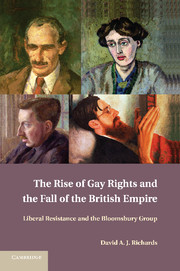 The Rise of Gay Rights and the Fall of the British Empire
The Rise of Gay Rights and the Fall of the British Empire 5 - Gay Rights in Former British Colonies: Legacy of Empire?
Published online by Cambridge University Press: 05 June 2014
Summary
Despite the arguments to the contrary of liberal apologists such as John Stuart Mill, the British Empire appears to have been little concerned with introducing liberal democracy into its colonies. Indeed, the attempt to justify British imperialism and related practices on such grounds may not unreasonably be urged as grounds for questioning liberalism as a defensible political theory. There is a connection, and an important one, between the rise of gay rights in Britain and the serious questioning in Britain of its imperialism, but the connection, as we have shown, led to a criticism of practices of British patriarchy at home and abroad (enforcing the patriarchal Love Laws) as inconsistent with the deeper values of liberal democracy, as the British resistance group discovered through its experiments in living that the sexual love of equals, resisting the divisions imposed by the Love Laws, enabled them through such love to resist the ways patriarchy destroyed love and rationalized unjust violence at home and abroad (including the violence of World War I). So the rise of gay rights and British imperialism were very much at odds, as we can see clearly in Leonard Woolf, who moves from being a successful agent of British imperialism in Ceylon to, under the impact of his remarkable marriage to Virginia Woolf and friendship with Lytton Strachey, a stance of resistance, reflected both in the novel he wrote based on his experiences in Ceylon and his books criticizing imperialism. And what gay men like E. M. Forster and Roger Casement discovered in having sex with natives (breaking the Love Laws of both race and gender) was a liberation of ethical intelligence in seeking to expose to the wider world how racism rationalized not just unjust imperial hierarchies but genocide.
- Type
- Chapter
- Information
- The Rise of Gay Rights and the Fall of the British EmpireLiberal Resistance and the Bloomsbury Group, pp. 208 - 230Publisher: Cambridge University PressPrint publication year: 2013


